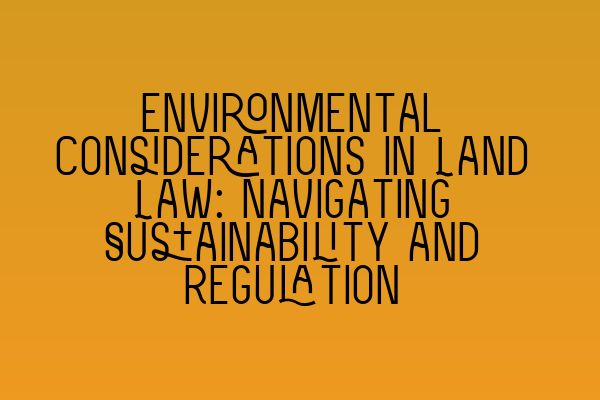Environmental Considerations in Land Law: Navigating Sustainability and Regulation
In recent years, there has been a growing awareness of the impact that human activities have on the environment. As a result, environmental considerations have become an integral part of various areas of law, including land law. This article explores the importance of integrating sustainability and regulation into land law matters, and how navigating these issues can help to promote a more environmentally conscious approach to property transactions.
The Role of Land Law in Environmental Protection
Land law plays a crucial role in addressing environmental concerns by providing a legal framework for the use and management of land and its resources. It establishes the rights and obligations of landowners, users, and occupants, and governs how land can be developed and used for different purposes.
One of the key considerations in land law is the preservation and protection of natural habitats and ecosystems. This involves ensuring that development activities do not cause irreversible damage to the environment and promoting sustainable land use practices.
Sustainability and Land Use
Sustainability is a core principle that should guide land use decisions. It involves striking a balance between economic development, social well-being, and environmental protection to meet the needs of the present generation without compromising the ability of future generations to meet their own needs.
When engaging in property transactions, it is essential to consider the long-term environmental impact of the proposed land use. This requires assessing factors such as the potential for pollution, the depletion of natural resources, and the disturbance of ecological systems. Integrating these considerations into land transactions can help minimize harm to the environment and promote sustainable development.
For example, before purchasing or developing a piece of land, potential buyers or developers should conduct environmental due diligence to identify any environmental risks and liabilities associated with the property. This may involve assessing the soil quality, checking for contaminated land, or investigating any historical environmental incidents that may have occurred on the site.
By being proactive in assessing environmental risks, buyers and developers can make informed decisions that facilitate environmentally responsible land use and minimize potential legal and financial liability.
Regulatory Framework and Compliance
To ensure the protection of the environment, land law is supported by a comprehensive regulatory framework that sets out specific requirements and standards for land use activities. Compliance with these regulations is crucial for maintaining environmental sustainability and avoiding legal repercussions.
The regulatory framework includes a wide range of legislation and regulations at both the national and international levels. These may cover areas such as environmental impact assessments, waste management, conservation of natural resources, and protection of endangered species.
It is imperative for individuals and organizations involved in land transactions to stay up-to-date with the latest environmental regulations and ensure compliance at all stages of the transaction. Failure to comply with these regulations can result in severe penalties, legal disputes, and reputational damage.
Working with experienced professionals, such as specialist property solicitors who have expertise in environmental law, can help navigate the complex regulatory landscape and ensure compliance with all relevant environmental obligations.
Promoting Sustainability in Land Law
Promoting sustainability in land law requires a collaborative effort from all stakeholders involved in property transactions. This includes buyers, sellers, developers, local authorities, and legal professionals.
One way to encourage sustainable land use is by incorporating environmental clauses into land contracts and agreements. These clauses can ensure that the parties involved commit to pursuing environmentally responsible practices during the use and development of the land.
Additionally, adopting voluntary sustainability standards, such as certification schemes or green building codes, can provide further guidance and accountability in promoting sustainable land development.
More broadly, raising awareness about the importance of sustainability in land law through educational initiatives, webinars, and expert insights can help to instill a culture of environmental responsibility within the legal profession and the wider property industry.
Conclusion
Environmental considerations are essential in land law to safeguard our natural resources and ensure the long-term sustainability of land use. By integrating sustainability into property transactions and complying with relevant environmental regulations, we can pave the way for a more environmentally conscious approach to land development. Working with knowledgeable property and environmental law professionals can facilitate this process, ensuring that all environmental considerations are effectively addressed, and the legal requirements are met.
Related Articles:
